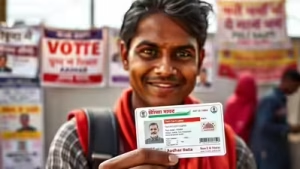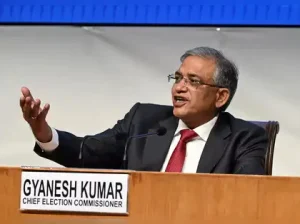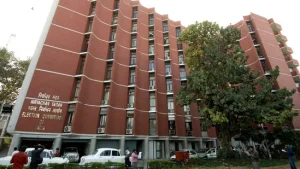Bihar – The Election Commission Of India has issued comprehensive instructions to its Bihar electoral machinery to accept Aadhaar card as an additional identity verification document for voters, marking a significant development in the Bihar Aadhaar voter ID implementation process. This directive comes in direct response to Supreme Court instructions and represents a crucial expansion of acceptable identity documentation for electoral purposes.
The decision establishes Aadhaar as the 12th acceptable document for voter identity verification, supplementing the existing list of 11 approved documents used in electoral processes across the state.
Official Communication to State Electoral Authority

In a formal letter addressed to the Bihar Chief Electoral Officer on Tuesday, the Election Commission provided explicit guidance regarding Bihar Aadhaar voter ID acceptance protocols. The communication specifically stated that “The Aadhaar card shall be treated as the 12th document, in addition to the 11 documents listed” for identity verification purposes.
This official directive ensures standardized implementation of Bihar Aadhaar voter ID procedures across all electoral constituencies within the state, creating uniform protocols for election officials and voters alike.
The Election Commission’s communication emphasizes the mandatory nature of this inclusion, leaving no room for discretionary implementation by local electoral authorities.
Clear Distinction Between Identity and Citizenship Proof
The Election Commission has established crucial parameters regarding Bihar Aadhaar voter ID utilization, specifically clarifying that Aadhaar cards must be accepted and utilized as “proof of identity and not as a proof of citizenship.” This distinction aligns with Section 9 of the Aadhaar (Delivery of Financial and Other Subsidies, Benefits and Services) Act.
This clarification addresses potential confusion regarding the scope of Bihar Aadhaar voter ID usage, ensuring that electoral officials understand the specific purpose and limitations of Aadhaar card acceptance in voter verification processes.
The distinction maintains constitutional and legal boundaries while facilitating broader identity verification options for eligible voters seeking to participate in democratic processes.
Legal Framework and Legislative Foundation
The Bihar Aadhaar voter ID directive operates within existing legal frameworks, particularly Section 23(4) of the Representation of People Act, 1950. Under this provision, Aadhaar cards are already enumerated as acceptable documents for establishing personal identity in electoral contexts.
This existing legislative foundation provides solid legal ground for Bihar Aadhaar voter ID implementation, ensuring that the Election Commission’s directive aligns with established statutory requirements and democratic principles.
The legal framework supports comprehensive identity verification while maintaining electoral integrity and preventing unauthorized participation in voting processes.
Supreme Court’s Decisive Intervention


The Bihar Aadhaar voter ID implementation follows direct Supreme Court intervention on Monday, when the apex court directed that Aadhaar cards “must” be included as identity proof for voters during special intensive revision exercises of electoral rolls in Bihar.
The Supreme Court established September 9 as the implementation deadline, requiring the Election Commission to execute the Bihar Aadhaar voter ID directive within this specified timeframe. This judicial mandate underscores the importance of inclusive voter verification processes.
Also Read: Latest AAP BJP Durga Puja Controversy Erupts Over PM Modi’s Prayer Request
The Supreme Court’s directive reflects broader concerns about ensuring comprehensive access to democratic participation while maintaining electoral roll accuracy and integrity.
Strict Compliance Requirements and Consequences


The Election Commission has established stringent compliance expectations for Bihar Aadhaar voter ID acceptance, warning that “any instance of non-compliance or refusal to accept Aadhaar in accordance with this directive shall be treated with utmost seriousness.”
This stern warning ensures that electoral officials cannot arbitrarily reject Bihar Aadhaar voter ID presentations, protecting voters’ rights while maintaining standardized verification procedures across all polling stations and electoral offices.
The compliance framework creates accountability mechanisms for proper implementation and prevents discriminatory practices in voter verification processes.
Impact on Electoral Roll Revision Process


The Bihar Aadhaar voter ID inclusion significantly impacts the special intensive revision exercise of electoral rolls currently underway in Bihar. This comprehensive revision process benefits from expanded identity verification options, potentially increasing voter registration rates among eligible citizens.
The enhanced documentation options through Bihar Aadhaar voter ID acceptance may facilitate registration for individuals who previously faced challenges providing alternative identity documentation, promoting broader democratic participation.
Broader Implications for Democratic Participation
The Bihar Aadhaar voter ID directive establishes important precedents for electoral identity verification across India, potentially influencing similar implementations in other states. The decision balances security requirements with accessibility concerns, ensuring that eligible voters can participate effectively in democratic processes.
This development represents a significant step toward leveraging digital identity infrastructure for electoral purposes while maintaining appropriate safeguards and legal boundaries. The Bihar Aadhaar voter ID implementation may serve as a model for future electoral reforms and identity verification enhancements nationwide.
The directive ultimately strengthens democratic foundations by expanding legitimate pathways for voter verification while maintaining electoral integrity and constitutional compliance.

